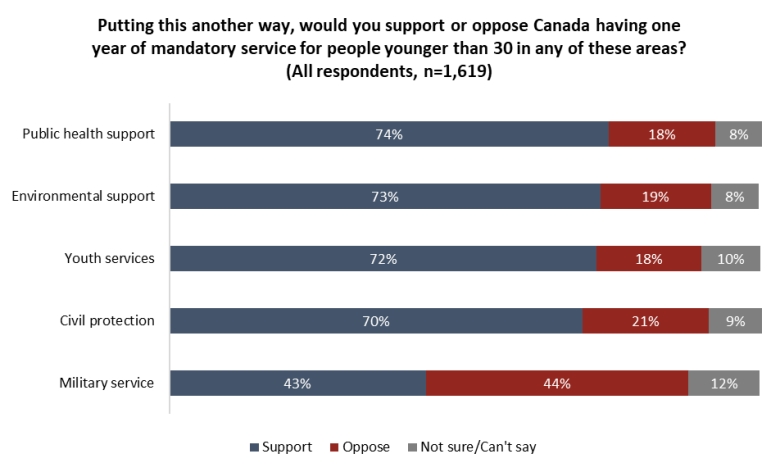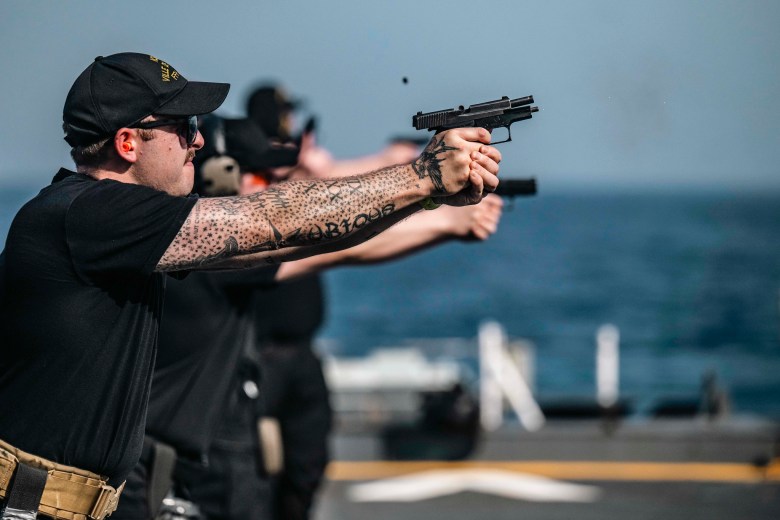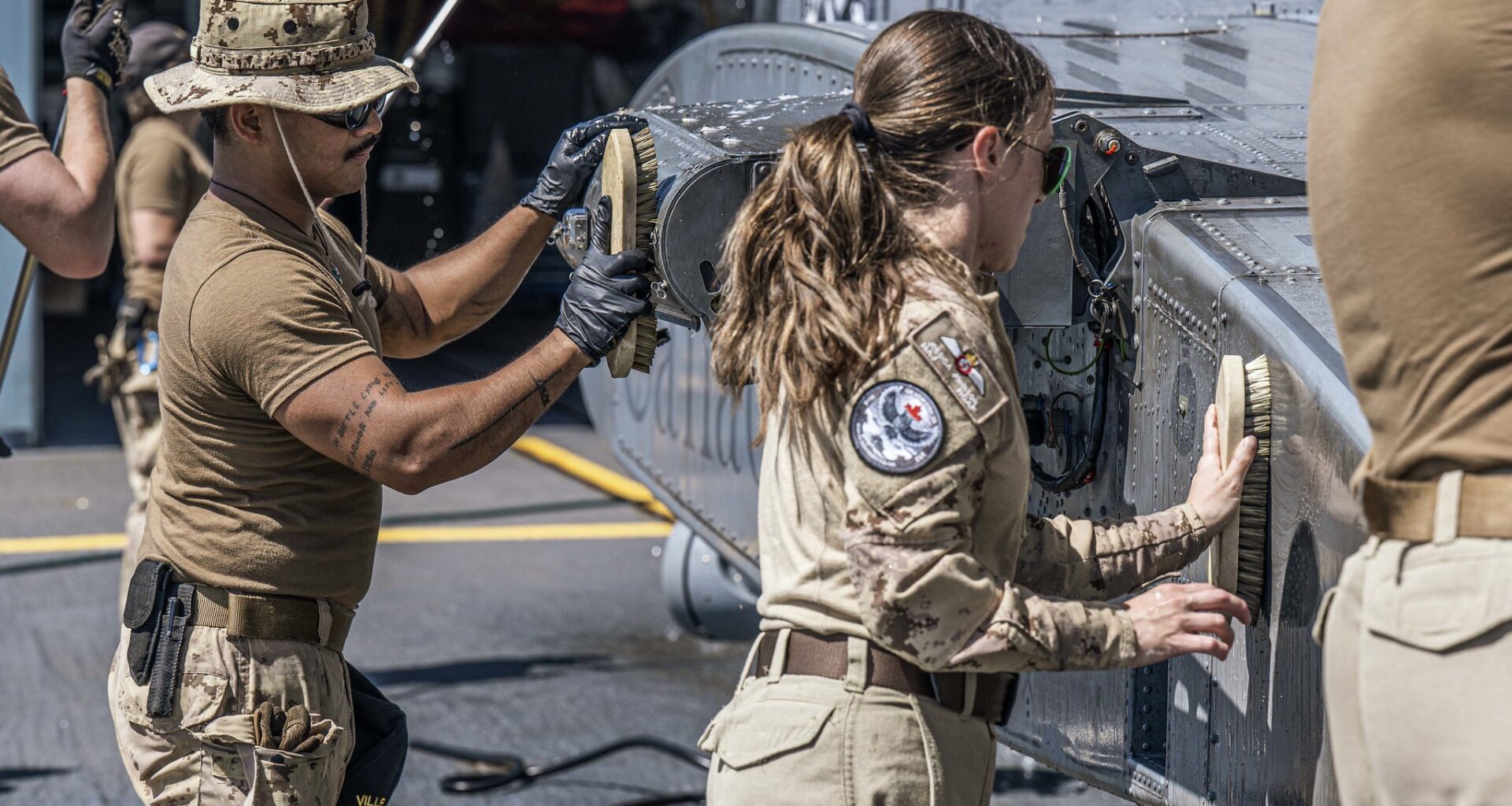Read: 5 min
New Angus Reid polling shows Canadians under 30 do not support compulsory military service but overwhelmingly support mandatory civilian service.
And the divide appears to be linked to perceptions of impact.
“It isn’t exactly obvious to me how I would be helping society by enlisting as a low-ranking recruit,” Owen Lamonte, a 20-year-old student at the University of Ottawa, told Canadian Affairs in an interview.
“[Through civil service] you’re contributing to your community and the people around you in a tangible way that … positively impacts their lives.
“With military service, you just don’t have that.”
Lamonte’s view is shared by other young Canadians, who told Canadian Affairs they favour civilian service for its community impact and skill-building, while questioning the military’s mission and workplace conditions.
“When is the last time that the Canadian military got involved in a conflict that meaningfully improved the lives of Canadians in a positive way?” said Lamonte.
Contributing to society
The Angus Reid survey asked more than 1,600 adult Canadians whether they would support one year of mandatory, “donated” national service by those under 30.
Mandatory service has emerged in countries such as Germany, France and Norway in recent years as a way to engage citizens, the survey report says.
The survey showed strong support for mandatory civilian service in areas such as public health, community service or education — particularly among young Canadians. About 70 per cent of respondents under 30 said they would support civilian service, versus just 23 per cent of those over 30.
But mandatory military service — such as roles in the Armed Forces, cybersecurity, logistics or disaster response — was far more divisive, with just 43 per cent of Canadians under 30 saying they would support it.
 Canadian survey results for mandatory civilian service for those under 30; August 10, 2025. | Angus Reid Institute
Canadian survey results for mandatory civilian service for those under 30; August 10, 2025. | Angus Reid Institute
Support for mandatory military service was strongest among men aged 50 and older.
“Given the option to choose between the two broad areas [of civilian or military service], it is clear that Canadians would rather some form of civilian service that does not revolve around the Armed Forces,” the survey report says.
Practical job skills
Survey respondents and Gen Zers interviewed for this story said they prefer civilian roles for their practicality and clear societal benefit.
Lamonte, of the University of Ottawa, says civilian service is a way of “getting out and meeting people” — something that is vital in today’s job market.
Nick Ouellette, 26, from Pictou County, N.S., agrees. He believes civilian service could help him build crucial job and social skills.
“There’s a lot of people in my age range that … have never held jobs,” said Ouellette. “They’ve never been able to develop the social skills to go out into the real world [and] they don’t know how to interact with people.
“I think it’d be a great way for them to learn those skills.”
Adeoye Otusajo, 25, from Gagetown, N.B., believes the military does provide transferable skills, but says many people may be unaware of the career pathways out of the military.
Otusago says he has twice considered joining the Canadian Armed Forces — in 2018 out of personal interest, and again in 2024 as a career option in a tough job market — but ultimately decided not to apply.
“Civilian service just seems more practical,” he said.
Others said the military’s reputation for poor workplace conditions is a deterrent to serving.
“Their bases are just riddled with black mold, and they haven’t, in some cases, been touched since the 1950s,” said Ouellette, describing what he has heard from friends in the military.
Lamonte, who has not spent time in the military, says he believes it has a toxic culture where recruits are “talked down to” and authority feels “aggressive and demeaning.”
Otusajo noted that he had “seen and heard the effects of PTSD, and the physical injuries they’ve had to endure from their time that persists onwards after service.”
“I’ve also heard about the lack of retention problems from bad management,” he said.
‘Make it worthwhile’
Other Gen Zers say they question who the military really serves.
In recent posts on the social media forum Reddit, some young Canadians said they view modern military missions as largely advancing foreign or elite agendas, rather than protecting citizens.
“I am not dying for a oil company,” R.G., 20, of Barrie, Ont., wrote in a post. “If I am going to fight in a war, make it worthwhile.
“Don’t make me fight, kill, get injured and maybe even die for some bullshit.”
 Sailor 1st Class Chad Surette fires the Sig Sauer for a force protection shoot onboard HMCS Ville de Québec, while sailing as a part of the U.K.-led Carrier Strike Group, during Op HORIZON, in the Arabian Sea, on June 1, 2025. | Corporal Brendan Gamache
Sailor 1st Class Chad Surette fires the Sig Sauer for a force protection shoot onboard HMCS Ville de Québec, while sailing as a part of the U.K.-led Carrier Strike Group, during Op HORIZON, in the Arabian Sea, on June 1, 2025. | Corporal Brendan Gamache
Another commentator put it more bluntly: “The military works for the interests of the 1 per cent.”
Marcus, 37, who has served in the Forces for 13 years, understands these perspectives — but says they are not accurate.
“I had assumptions growing up — most people do. There’s a fear of being ‘indoctrinated into the war machine’,” said Marcus, whom Canadian Affairs agreed not to identify by his real name to protect his job.
“That can be true in some combat trades, but those make up only a slice of the pie. It’s a loud slice that’s out front and often overshadows the rest.”
Marcus began serving in the Forces at age 24 and spent six years in a naval environment and another six with Canadian Special Operations Forces Command, which handles high-risk missions.
He says the military offers unparalleled training and career skills — and unmatched experiences.
“Some people can join with nothing more than a backpack of their belongings, and no tangible skills,” he said. He has been posted to 30 European and African ports, helped flood victims in Ontario, and assisted in the evacuation of Afghans fleeing Taliban rule.
But veteran Jason Miners, 46, from eastern Ontario, can relate to Gen Zers’ skepticism about the military.
“I joined to protect my country, ended up in a foreign war zone, fighting a militia that wasn’t even in the same country,” he wrote on Reddit.
Miners, who served from 1998 to 2006, told Canadian Affairs that civilian deaths often stemmed from “routine communication failures or bad info on targets.” Over time, he came to see political and corporate interests — not security — as driving missions.
He pointed to Canada’s participation in the multinational invasion of Afghanistan in 2001 as one example.
“We knew damn well Bin Laden was in Pakistan,” he said. “So why were we in Afghanistan, fighting a war in the ‘graveyard of empires,’ while he moved to safety under the protection of a country with a strong military and diplomatic structure?”
His experiences left him convinced civilian service offers a clearer moral purpose.
“Civilian service avoids the horrors of war while still supporting national defence and social infrastructure,” he said.
“Sending young men overseas to force change in another society? That’s a baseline for evil.”
Otusajo, too, says he would consider the military if Canada itself was threatened.
“If a looming threat to Canada comes, then sure, I’ll have no issue restarting that application again,” he said.
Related Posts

